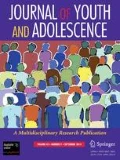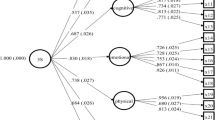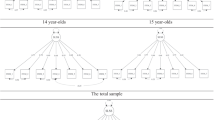Abstract
The Satisfaction With Life Scale (SWLS) was developed in the United States as a multiitem scale for the overall assessment of life satisfaction as cognitive-judgmental process, rather as a measurement of specific satisfaction areas (e.g., health, energy). The present study attempted to extend the applicability of the SWLS by investigating specific aspects of reliability and validity in a different cultural context (Portugal) with adolescents. In line with previous American findings, reliability figures were found to be favourable. SWLS scores were affected by sex and sociocultural level. In addition, SWLS scores showed to be predictably associated with psychological measures: loneliness, social anxiety, shyness, self- concept, and physical attractiveness. The variables that best predicted satisfaction were overall self-concept, loneliness, and physical attractiveness.
Similar content being viewed by others
References
Andrews, F. M., and Withey, S. B. (1976).Social Indicators of Well-Being: America's Perception of Life Quality. New York: Plenum.
Argyle, M. (1987).The Psychology of Happiness. Methuen, London.
Berscheid, E., and Walster, E. H. (1974). Physical attractiveness.Adv. Exper. Social Psychol. 7: 158–216.
Brislin, R. (1986). The wording and translation of research instruments. In Lonner, W., and Berry, J. (eds.),Field Methods in Cross-Cultural Research. Sage Publications, Beverly Hills, CA.
Campbell, A. (1981).The Sense of Well-Being in America. McGraw-Hill, New York.
Campbell, A., Converse, P. E., and Rodgers, W. L. (1976).The Quality of American Life. Sage Foundation, New York.
Cantril, H. (1965).The Pattern of Human Concerns. Rutgers University Press, New Brunswick, NJ.
Diener, E. (1984). Subjective well-being.Psychol. Bull. 95: 542–575.
Diener, E., Emmons, R. A., Larsen, R. J., & Griffin, S. (1985). The satisfaction with life scale.J. Personal. Assess. 49: 1, 71–75.
Eysenck, M. W. (1990).Happiness: Facts and Myths. LEA, Hove, East Sussex.
Fenigstein, A., Scheier, M., and Buss, A. (1975). Public and private self-consciousness: Assessment and theory.J. Consult. Clin. Psychol. 43: 522–527.
Kozma, A., and Stones, M. J. (1978). Some research issues and findings in the study of psychological well-being in the aged.Can. Psychol. Rev. 19: 241–249.
Lautrey, J. (1980).Classe Sociale, milieu familial, Intelligence. PUF, Paris.
Liang, J., and Fairchild, T. (1979). Relative deprivation and perception of financial adequacy among the aged.J. Gerontol. 34: 746–759.
Medley, M. (1980). Life satisfaction across four stages of adult life.Int. J. Aging Human Develop. 11: 193–209.
Michalos, A. C. (1980). Satisfaction and happiness.Social Indicators Res. 8: 385–422.
Neto, F. (1986). Amigração portuguesa vivida e representada: Contribuição para o estudo dos projectos migratórios. Secretaria de Estado das Comunidades Portuguesas, Centro de Estudos, Porto.
Neto, F. (1989a). A escala de solidão da UCLA: adaptação portuguesa.Psicologia Clín 2: 65–79.
Neto, F. (1989b). L'évaluation de la conscience de soi: Réplication portugaise. In J. Retschitzky, J., Bossel-Lagos, M., and Dasen, P. (eds.),La recherche interculturelle tome 1. L'Harmattan, Paris.
Neto, F. (1989c). Solitude, concept de soi et anxiété sociale.Cahiers d'Anthropologie et Biométrie Humaine 7: 173–179.
Neto, F. (1992).Solidão, embaraço e amor. Centro de Psicologia Social, Porto.
Palmore, E. (1979). Predictors of successful aging.Gerontologist 19: 427–431.
Reid, D., and Ziegler, M. (1980). Validity and stability of a new desired control measure pertaining to psychological adjustment of the elderly.J. Gerontol. 35: 395–402.
Russel, D., Peplau, L. A., and Cutrona, C. E. (1980). The revised UCLA Loneliness Scale: Concurrent and discriminant validity evidence.J. Personal. Social Psychol. 39: 472–480.
Shin, D. C., and Johnson, D. M. (1978). Avowed happiness as an overall assessment of the quality of life.Social Indicators Res. 5: 474–492.
Spreitzer, E., and Snyder, E. (1974). Correlates of life satisfaction among aged.J. Gerontol. 29: 454–458.
Vaz Serra, A. (1986). O inventário clínico de auto-conceito.Psiquiatria Clin. 7: 67–84.
Warr, P., and Payne, R. (1982). Experience of strain and pleasure among British adults.Social Sci. Med. 16: 1691–7.
Author information
Authors and Affiliations
Additional information
Received a Ph.D. in normal and abnormal anthropology from École des Hautes Études en Sciences Sociales (Paris) in 1980 and a Ph.D. in Social Psychology from Faculty of Psychology (Porto) and an “Aggregation” in Psychology from Faculty of Psychology (Coimbra) in 1990. Research interests include migration and cross-cultural social migration.
The author wishes to thank the anonymous reviewers for their helpful comments on an earlier version of this paper.
Rights and permissions
About this article
Cite this article
Neto, F. The satisfaction with life scale: Psychometrics properties in an adolescent sample. J Youth Adolescence 22, 125–134 (1993). https://doi.org/10.1007/BF01536648
Received:
Accepted:
Issue Date:
DOI: https://doi.org/10.1007/BF01536648




